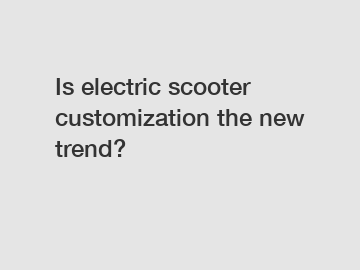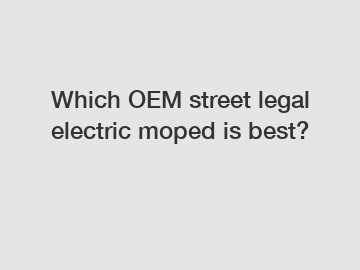How to Choose Motor Cooling Types Effectively?
Choosing the right motor cooling type is crucial for enhancing the performance and longevity of your machinery. Effective cooling prevents overheating, reduces wear and tear, and ensures that your motor functions at optimal levels. In this article, we’ll explore the various motor cooling types, their advantages, and how to make an informed decision. Additionally, we’ll highlight insights from industry leaders to further enrich your understanding.
The Importance of Motor Cooling
When it comes to electric motors, effective cooling is not an option but a necessity. Overheating can lead to reduced efficiency, increased energy consumption, and ultimately, motor failure. By understanding the cooling types available, you can make a better choice that aligns with your operational requirements and goals.
Types of Motor Cooling Systems
1. Air Cooling
Air cooling is one of the most common methods, utilizing ambient air to dissipate heat from the motor. This type is simple and cost-effective, making it suitable for smaller motors or applications where environmental temperatures are manageable.
2. Water Cooling
Water cooling is more efficient than air cooling, especially for larger motors or in applications with higher heat generation. Water-cooled systems can be either closed-loop or open-loop and often require more upfront investment and maintenance.
3. Oil Cooling
Oil cooling utilizes a special oil that circulates through the motor to absorb heat. This method is highly effective and can provide additional lubrication. However, it is more complex and expensive, making it suitable for high-performance applications.
4. Hybrid Cooling
Hybrid systems combine two or more cooling methods, maximizing efficiency for various operating conditions. This approach can be tailored to specific applications, allowing for flexibility and enhanced performance.
5. Direct Liquid Cooling
In direct liquid cooling, coolant is directly injected into the motor. It provides excellent thermal management, making it ideal for high-power applications. However, it requires careful design to avoid leaks and other complications.
6. Compact Cooling Systems
These innovative systems are designed for space-constrained environments. They integrate advanced cooling technologies to ensure efficient heat dissipation without significantly increasing the motor's size.
Suggested reading:Exploring Various Types of Motor Cooling Methods
Factors to Consider When Choosing a Cooling Type
Key Questions to Ask When Choosing a Street Legal Electric Moped Supplier
Key Questions to Ask When Choosing Custom Mountain Bike Tires
Questions You Should Know about Engine Parts
Key Questions to Ask When Ordering Best HD Truck Tires
How to Save Money When Buying Oil Filtration Systems
Understanding the basics of electricity by thinking of it as water
When selecting a motor cooling type, consider the following factors:
1. Application Environment
The operating environment may dictate the type of cooling needed. For example, motors in high-temperature environments might require water or oil cooling, while those in regulated conditions may function with air cooling.
2. Motor Size and Output
Larger motors with higher outputs generate more heat, necessitating more effective cooling solutions. Assess the specifications of your motor to determine the most suitable cooling method.
3. Cost and Maintenance
Consider both the initial investment and ongoing maintenance costs. Some cooling methods may have higher upfront costs but lower maintenance requirements.
4. Energy Efficiency
Opt for cooling systems that enhance energy efficiency, as this will contribute to lower operational costs and reduced environmental impact.
Engaging with Industry Influencers
Connecting with industry experts can provide valuable insights. For instance, influencers like Mark Johnson, a mechanical engineering specialist, often discuss innovative cooling technologies. Another great source is Jane Smith, who writes extensively about motor efficiency and performance.
Conclusion
Choosing the right motor cooling type is essential for optimal performance and durability. By understanding the various options available and considering factors such as application environment, motor size, and cost, you can make an informed decision. Engaging with industry leaders will further enhance your knowledge and ensure your cooling system supports your operational needs effectively.
For more automotive can display, touch screen capacitorinformation, please contact us. We will provide professional answers.
Suggested reading:Filter Accessories
Fuel System & Fuel Additives
What is the difference between electric scooter and electric motorcycle?
What are the positives and negatives of e-scooters?
What is Electric Moped Scooter and Why Do We Use Them?
Top 2 Wheeler Scooters for Stylish Ladies
5 Reasons Matt Blue Car Wrap is the Ultimate Style Upgrade
Related Articles









Comments